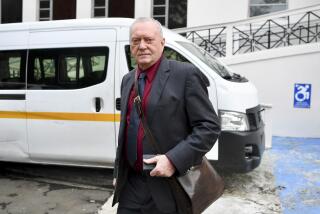Accounting Director of Carl’s Jr. Freed of Criminal Charge of Insider Trading
- Share via
LOS ANGELES — Alvin DeShano, the accounting director for the Carl’s Jr. hamburger chain, was acquitted today of a criminal charge of insider trading.
“I’m obviously very happy,” DeShano said after U.S. District Judge A. Wallace Tashima announced the verdict. “I screwed up and sold at the wrong time--but I definitely did not intend” to violate securities laws. “I think they saw I was an honorable man.”
DeShano, 55, of Orange was accused of using confidential company information to avoid a $7,107 loss on stock of Anaheim-based Carl Karcher Enterprises, which runs the Carl’s Jr. fast-food chains.
His criminal trial stems from a broader civil suit filed 14 months ago by the Securities and Exchange Commission against Carl N. Karcher, chairman and chief executive of Karcher Enterprises, 14 Karcher relatives and DeShano. The SEC accused the 16 defendants of avoiding market losses of at least $310,000 in 1984 by selling securities before a dramatic earnings decline was made public.
The civil case is pending against Carl Karcher and six of his relatives, but trial has been indefinitely postponed. Six other relatives settled with the SEC and agreed to pay fines; Carl Karcher’s son, Carl Leo, was judged to have violated securities laws, and Carl Karcher’s wife was dropped from the civil suit.
DeShano, who has worked at Karcher Enterprises for 15 years, was the only one who was criminally charged. He remains a defendant in the SEC’s civil suit.
Jurors reached their decision after almost two days of deliberations. After the verdict was announced, Assistant U.S. Atty. James Sanders said, “The jurors deliberated and spent time with the case. . . . We accept their verdict.”
DeShano sold his 1,725 shares of Karcher stock Oct. 15, 1984, the first trading day after company executives received a preliminary internal report estimating that earnings for one month would be as much as $900,000 below earlier projections.
When news of the chain’s lower earnings became public on Oct. 23, Karcher stock plunged $4.125 per share to $17.375.
During five days of testimony, defense lawyer David Wiechert of Irvine portrayed DeShano as an unsophisticated investor who never intended to use confidential information or defraud investors. He called witnesses who testified that DeShano had discussed selling his company stock with two Karcher executives before he had any idea about the impending drop in the company’s stock.
DeShano testified that he sold company stock because he wanted to diversify his investments, not because he believed that the price was about to plummet.
Susan Wiech, co-defense counsel, said jurors told her that they believed DeShano’s testimony during the trial.
“The system worked,” Wiechert said. DeShano “is an individual who spent 55 years as an honest, upstanding citizen. The jurors didn’t believe you’re going to buy someone like that for $7,000.”
More to Read
Inside the business of entertainment
The Wide Shot brings you news, analysis and insights on everything from streaming wars to production — and what it all means for the future.
You may occasionally receive promotional content from the Los Angeles Times.










